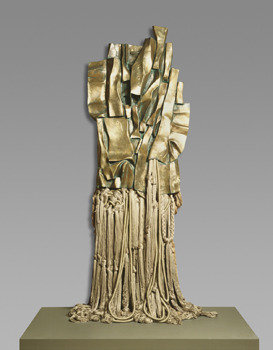Barbara Chase-Riboud
dal 13/9/2013 al 19/1/2014
Segnalato da
13/9/2013
Barbara Chase-Riboud
Philadelphia Museum of Art Perelman Building, Philadelphia
The Malcolm X steles. With related sculptures and drawings, the exhibition brings together more than forty works from the United States and Europe in the artist's first solo museum exhibition in more than ten years.

For more than four decades, Barbara Chase-Riboud has integrated mediums and materials in uniquely expressive ways to create a remarkable body of literary and visual arts. This fall, the Philadelphia Museum of Art will present the first comprehensive survey of her iconic "Malcolm X" steles. With related sculptures and drawings, the exhibition brings together more than forty works from the United States and Europe in the artist's first solo museum exhibition in more than ten years.
Chase-Riboud's sculptures dedicated to Malcolm X have been likened to contemporary interpretations of the steles erected in various parts of the ancient world to commemorate important people and events. Cast from cut and folded sheets of wax, the sculptures combine bronze, manipulated into undulating folds and crevices, with knotted and braided silk and wool fiber. This expressive melding of forms and materials is evident in the Museum's own Malcolm X #3 (1969), which matches the golden hue of polished bronze with cascades of glossy silk thread—a combination that conveys a subtle tension and unity among opposites.
The artist developed the first four sculptures in this series in 1969, inspired by the civil rights movement and her political and personal experiences living in France and traveling to North Africa, China, and the Soviet Union. Chase-Riboud returned to the series in 2003 and again in 2007–8, creating a total of nine additional works. Reconciling vertical and horizontal, mineral and organic, light and dark, the artist has forged in the "Malcolm X" steles powerful beacons dedicated to the possibility of cultural integration. The exhibition also includes sculptures that share an affinity with the "Malcolm X" series, such as All That Rises Must Converge/Gold (1973) and Tantra #1 (1994).
Selections from the artist's "Le Lit (The Bed)" series of drawings from 1966 will also be on view. Accomplished studies of texture, form, and metamorphosis, they depict recumbent figures that appear to emerge from the peaks and valleys of rumpled sheets. Out of the "Le Lit" series, Chase-Riboud developed exquisite charcoal landscapes of piled stones and meandering cords. This is seen in Landscape and Cords (c. 1973), which reveals how the artist's drawing practice continued to parallel the development of her abstract sculptures.
In the Monument Drawings of 1996–97, Chase-Riboud reused an etching as the starting point for unique compositions that she enhanced and obscured by delicate charcoal, graphite, and ink lines. The titles of these works refer to idiosyncratic pairs of geographic locations and historical or literary figures, such as Alexander Pushkin, Man Ray, the Queen of Sheba, and the fictional Count of Monte Cristo. Signifying imagined memorials to people, places, and events, they encourage viewers to consider for themselves our reasons and means for commemorating the past.
The exhibition will travel to the Berkeley Art Museum and Pacific Film Archive in spring 2014.
About the artist
Born in Philadelphia and educated at the Philadelphia High School for Girls, Temple University's Tyler School of Art, and the Yale University School of Design and Architecture, Chase-Riboud has lived in Paris since 1961. She is an internationally acclaimed visual artist whose widely exhibited work has been seen in solo exhibitions at the Musée d'art Moderne de la Ville de Paris and the Metropolitan Museum of Art, New York; group exhibitions at the Whitney Museum of American Art, New York; the Smithsonian American Art Museum, Washington, DC; and the Centre Georges Pompidou, Paris; and in major arts festivals, including documenta VI. Her towering public sculpture Africa Rising (1998) stands in the African Burial Ground National Monument in Lower Manhattan. Chase-Riboud is also an award-winning poet and writer, known for her books of poetry From Memphis and Peking (1974) and Portrait of a Nude Woman as Cleopatra (1988) and the historical novels Sally Hemings (1979), Echo of Lions (1989), and Hottentot Venus (2003). In 1996, she was knighted as Chevalier de l'Ordre des Arts et des Lettres.
Sponsorship
The exhibition is generously supported by The Andy Warhol Foundation for the Visual Arts.
The Philadelphia Museum of Art is one of the largest museums in the United States, with a collection of more than 227,000 works. At the core of its modern and contemporary art holdings are significant works by such celebrated artists as Pablo Picasso, Constantin Brancusi, Fernand Léger, and Joan Miró, as well as the largest and most important collection of work by Marcel Duchamp. The Museum's expanding contemporary roster includes major works by Cy Twombly, Jasper Johns, Ellsworth Kelly, and Bruce Nauman. The Museum's strong sculptural tradition is seen in the newly renovated Rodin Museum and the Anne d'Harnoncourt Sculpture Garden, currently featuring works by Sol LeWitt, Ellsworth Kelly, Franz West, Claes Oldenburg, and Thomas Schütte, as well as a series of sculptures by Isamu Noguchi installed as part of the Garden's inaugural exhibition.
For additional press information and images, contact the press office at pressroom@philamuseum.org or 215 684 7860. For general information, call 215 763 8100, or visit the Museum's website at philamuseum.org.
Barbara Chase-Riboud, Malcolm X #3, 1969. Polished bronze, rayon, and cotton, 299.7 × 120 × 25.1 cm, base: 70.5 × 40 cm. 125th Anniversary Acquisition. Purchased with funds contributed by Regina and Ragan A. Henry, and with funds raised in honor of the 125th Anniversary of the Museum and in celebration of African American art, 2001. 2001-92-1.
Opening: September 14 2013
Philadelphia Museum of Art
2600 Benjamin Franklin Parkway
Philadelphia, PA 19130
Hours: Tuesday–Sunday 10am–5pm,
Wednesday and Friday 10am–8:45pm
www.philamuseum.org



